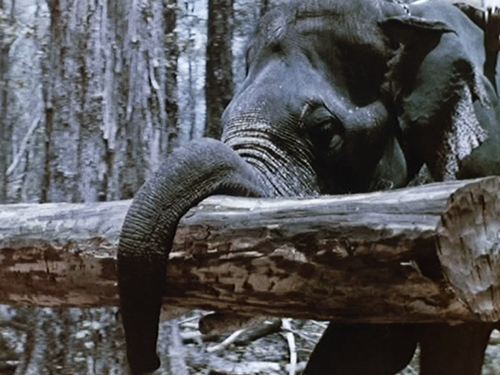
“My favorite Roberto Rossellini film is perhaps the hardest one to see–the restored French version of this 1959 masterpiece about India, which survives in only one unsubtitled print. [...] A sublime symbiosis of fable and nonfiction, India Matri Bhumi simply and poetically interrelates humans and animals, city and village, and society and nature over four separate stories. This visionary work is especially striking in the way its objective and subjective narrators merge into one another, reflecting not only the idea of reincarnation, but also the greater unity to which all of them belong.”
Jonathan Rosenbaum
“Among all the great directors, Roberto Rossellini is at once the most admired and the most attacked. The world-wide plaudits which greeted Rome, Open City became rarer and rarer as Germany Year Zero, Europa 51 and Stromboli reached our screens and La Macchina Ammazzacattivi and Dov'è la libertà...? did not reach them.
Whereas Paisà, not so very long ago, was the rage of the Cannes Festival, Fear came out last year in a seedy second-run cinema. But like Socrates (whose death was one of his film projects) and St Francis of Assisi (whose life he filmed), Roberto Rossellini, abandoned by almost everyone, forged steam ahead through the narrow gates of his art, no longer listening to anyone. Humility and logic were the only two beacons illuminating his voyage to the end of the cinematographic night, a voyage which led him to the fount of Indo-European civilization. Today, Roberto Rossellini has re-emerged with India 58, a film as great as Que Viva Mexico! or Birth of a Nation and which shows that this season in hell led to paradise, for India 58 is as beautiful as the creation of the world.”
Jean-Luc Godard1
'India is five hundred million people. More than a quarter of the human race. It’s a tidy number, I think. In my opinion, therefore, one should know India, or the Indies if you prefer. That is why I have made not only a film, but also several reportages intended as television documentaries. Today, nations are packed close together like sardines. People travel more and more frequently. It has even become a commonplace. Family life, in other words, has opened out on to a world scale. Consequently, the most important thing is to know one’s neighbour. Because before loving him, one must get to know him. I am accused of making films as a sniper. But this IS precisely why. I am going out on reconnaissance. A missionary is first and foremost an explorer; therefore a film-maker.
Before all else, one must know men as they are. And that is what the cinema is for, to film them in all latitudes, in all their adventures, and from every angle, good or bad. It is not for nothing that the camera lens can also be called an objective. One must try to approach men with objectivity and respect. One has no right to film an unpleasant person while having at the same time the intention of condemning him. I never permit myself to judge my characters. I simply show what they do and say. It was Balzac, I think, who often used to say at the beginning of the final chapters of his novels, ‘And now the facts speak for themselves’. And this is precisely what getting to the heart of things means. One must get to this extreme point where things speak for themselves. Which does not mean that they alone speak, but that they speak of what they really are. When you show a tree, it must speak to you of its beauty as a tree, a house of its beauty as a house, a river of its beauty as a river. Men and animals too. A tiger, an elephant, a monkey, is as interesting as a gangster or a society lady. And vice versa.”
Roberto Rossellini2
« L’Inde, c’est cinq cent millions d’hommes. Plus que le quart du genre humain. Je trouve que c’est un joli chiffre. A mon avis donc, il faut connaître l’Inde, ou les Indes, comme il vous plaira. C’est pour ça que j’ai fait, non seulement un film, mais également plusieurs reportages en forme de documentaire destinés à la télévision. Aujourd’hui, les pays sont serrés les uns contre les autres comme des sardines. On voyage de plus en plus, ça en devient même une banalité. Autrement dit, la vie de famille s’agrandit à l’échelon mondial. Par conséquent, la chose la plus importante, c’est de connaître son prochain. Car avant de l’aimer, il faut bien faire sa connaissance. On m’accuse de faire des films en franc-tireur. Mais c’est justement pour ça : je pars en reconnaissance. Un missionaire, c’est avant tout un explorateur, donc un cinéaste.
Avant tout, il faut connaître les hommes tels qu’ils sont. Et le cinéma est là pour ça, pour les filmer sous toutes les latitudes, dans toutes les aventures, sous tous les angles, les bons et les méchants. Ce n’est pas pour rien que les objectifs d’une caméra s’appellent ainsi. Il faut tâcher de s’approcher des hommes avec objectivité, avec respect. On n’a pas le droit de filmer un personnage horrible avec, en même temps, l’intention de le condamner. Moi je ne me permets jamais de porter un jugement sur mes personnages. Je me contente de montrer leurs faits et gestes. Il faut arriver à ce point extrême où les choses parlent d’elles-mêmes. Ce qui ne signifie pas uniquement qu’elles parlent toutes seules, mais qu’elles parlent de ce qu’elles sont en réalité. Quand vous montrez un arbre, il faut qu’il vous parle de sa beauté d’arbre, une maison de sa beauté de maison, un fleuve de sa beauté de fleuve. Et les hommes et les animaux aussi. Un tigre, un éléphant, un singe, c’est aussi intéressant qu’un gangster ou une femme du monde. Et vice-versa. »
Roberto Rossellini3